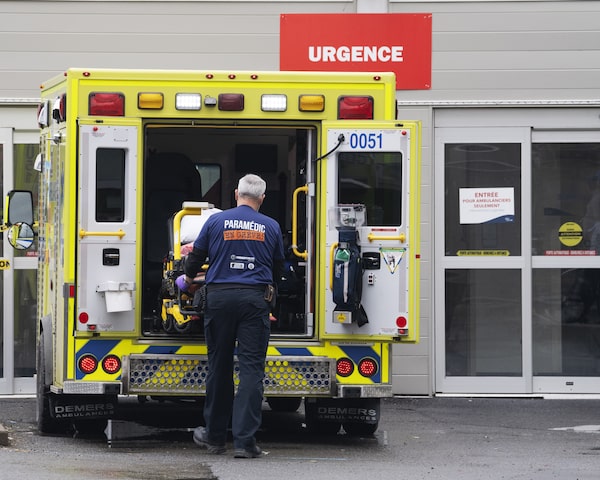
A paramedic loads a stretcher into an ambulance after bringing a patient to the emergency room at a hospital in Montreal on April 14, 2022.Ryan Remiorz/The Canadian Press
Hospital emergency rooms across the country are dealing with a crush of respiratory illnesses that are being compounded by staffing shortages, causing some provinces to urge people to stay home to ease overcrowding.
In Quebec, ERs were at 125-per-cent capacity on Monday, according to Index Santé, a health-data website. The provincial health department has been telling people to avoid hospitals if they have a fever and encouraged them to be prudent during New Year’s celebrations to slow the spread of illness.
Waiting times have been a critical issue in the province after two people died while waiting for care at a hospital in Châteauguay last month.
The province’s association of emergency-room doctors says occupancy rates are at unprecedented levels, and some hospitals are being overwhelmed with twice as many ER patients as they can handle.
Quebec’s Health Minister, Christian Dubé, said the public should stay away from ERs altogether, and instead seek care at family medicine clinics, or clinics led by nurse practitioners.
Benoît Barbeau, a virologist with the University of Quebec at Montreal, said unnecessary hospital visits across the country are causing a serious problem for ERs. Most symptoms from respiratory viruses can be treated at home, and only present a more serious risk for young children or medically-compromised people, he said.
“If you’re a healthy person, going to the ER for a common cold is definitely not a good idea because you might take time away from people who actually need help,” he said, “and you might get infected with something worse.”
Health officials in many provinces are dealing with a rise in influenza and Respiratory Syncytial Virus (RSV) cases that have been growing for months. Complications from the flu killed two children in British Columbia in December, according to the province’s Centre for Disease Control (BCCDC). The centre said on Dec. 29 that elevated influenza and RSV cases were at levels similar to those experienced before the COVID-19 pandemic.
The proportion of emergency-department and primary-care visits for respiratory symptoms has been increasing since early October across the province, according to the BCCDC. It has been particularly acute for children, who are experiencing the highest levels of illness since the start of this respiratory season.
For Canadians going into hospitals over the holiday weekend, it has meant hours-long waits for care. Patients at several Toronto hospitals faced four-hour waits on Monday. In Nova Scotia, some hospitals reported waiting times in excess of five hours, and one reported waits approaching seven hours.
In New Brunswick, where at least one hospital was closed overnight during the holiday period because of nurse shortages, the francophone health authority was asking the public to avoid two of its emergency rooms unless they absolutely needed critical care.
People who come to the emergency department for non-urgent reasons should be patient and expect much longer than usual waiting times, the health authority said in a news release.
The Ontario Nurses’ Association (ONA), which says the province needs an extra 24,000 registered nurses, said staffing limitations are combining with bed shortages, an aging population and a lack of community-care options to create a crisis inside hospitals.
“Wait times are through the roof,” ONA president Erin Ariss said last week. “Nurses are beginning their shifts in the morning and coming on to emergency departments that are full or overcapacity with admitted patients.”
A recent report by Ontario’s Auditor-General blamed the province’s inability to properly staff hospitals for a rise in emergency-department closings. The report found that waiting times were increasing, closings have become common, and some hospitals are dealing with as many as one in four jobs left unfilled.
It’s a problem across the country, nursing unions and physician groups say. Two hospitals in Regina, where staffing shortages have combined with a lack of space for people needing long-term or alternative care, were recently warned by fire officials after hallways were crowded with patient beds.
While databases recording respiratory illnesses weren’t updated over the holidays in Western Canada, the week leading up to Christmas saw an uptick in cases across B.C., Alberta and Saskatchewan.
In Saskatchewan, the most-recent monitoring report from Dec. 22 showed a steady rise in RSV cases, though influenza cases and total hospital admissions for respiratory viruses both decreased. Alberta also saw a rise in RSV cases in the lead-up to Christmas. Confirmed cases of the flu dropped slightly.
With a report from The Canadian Press
 Greg Mercer
Greg Mercer Emma Graney
Emma Graney